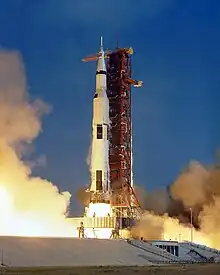| Function | Uncrewed LEO and Lunar launch vehicle |
|---|---|
| Manufacturer | Von Braun |
| Country of origin | United States |
| Size | |
| Height | 51.00 m (167.32 ft) |
| Diameter | 6.61 m (21.7 ft) |
| Mass | 1,511,980 kg (3,333,350 lb) |
| Stages | 2 |
| Capacity | |
| Payload to LEO | |
| Mass | 33,000 kg (73,000 lb) |
| Launch history | |
| Status | Concept/study |
| Launch sites | N/A |
| Total launches | N/A |
| Boosters – Titan UA1205 | |
| No. boosters | 4 |
| Powered by | 1 United Technologies UA1205 |
| Maximum thrust | 5,849.411 kN (1,315,000 lbf) |
| Specific impulse | 263 s (2.58 km/s) |
| Burn time | 115 seconds |
| Propellant | PBAN[1] |
| First stage – S-1B | |
| Powered by | 8 Rocketdyne H-1 |
| Maximum thrust | 8,241.763 kN (1,852,822 lbf) |
| Specific impulse | 296 s (2.90 km/s) |
| Burn time | 155 seconds |
| Propellant | RP-1/LOX |
| Second stage – S-IVB | |
| Powered by | 1 Rocketdyne J-2 |
| Maximum thrust | 1,031.600 kN (231,913 lbf) |
| Specific impulse | 421 s (4.13 km/s) |
| Burn time | 475 seconds |
| Propellant | LH2/LOX |
Studied by Douglas Aircraft Company in 1965, this rocket consisted of a whole Saturn IB with 4 strap-on SRBs that have flown on the Titan 3E interplanetary missile carriers. All components of the vehicle have flown, but not together for this concept.[2]
References
- ↑ Wade, Mark. "UA1205". www.astronautix.com. Encyclopedia Astronautica. Archived from the original on December 28, 2016. Retrieved 10 June 2020.
- ↑ Wade, Mark. "Saturn IB-D". www.astronautix.com. Encyclopedia Astronautica. Archived from the original on December 28, 2016. Retrieved 10 June 2020.
Lowther, Scott, Saturn: Development, Details, Derivatives and Descendants, Work in progress. Available chapters may be ordered directly from Scott Lowther at web site indicated. Accessed at: https://web.archive.org/web/20070521083808/http://www.webcreations.com/ptm.
This article is issued from Wikipedia. The text is licensed under Creative Commons - Attribution - Sharealike. Additional terms may apply for the media files.
